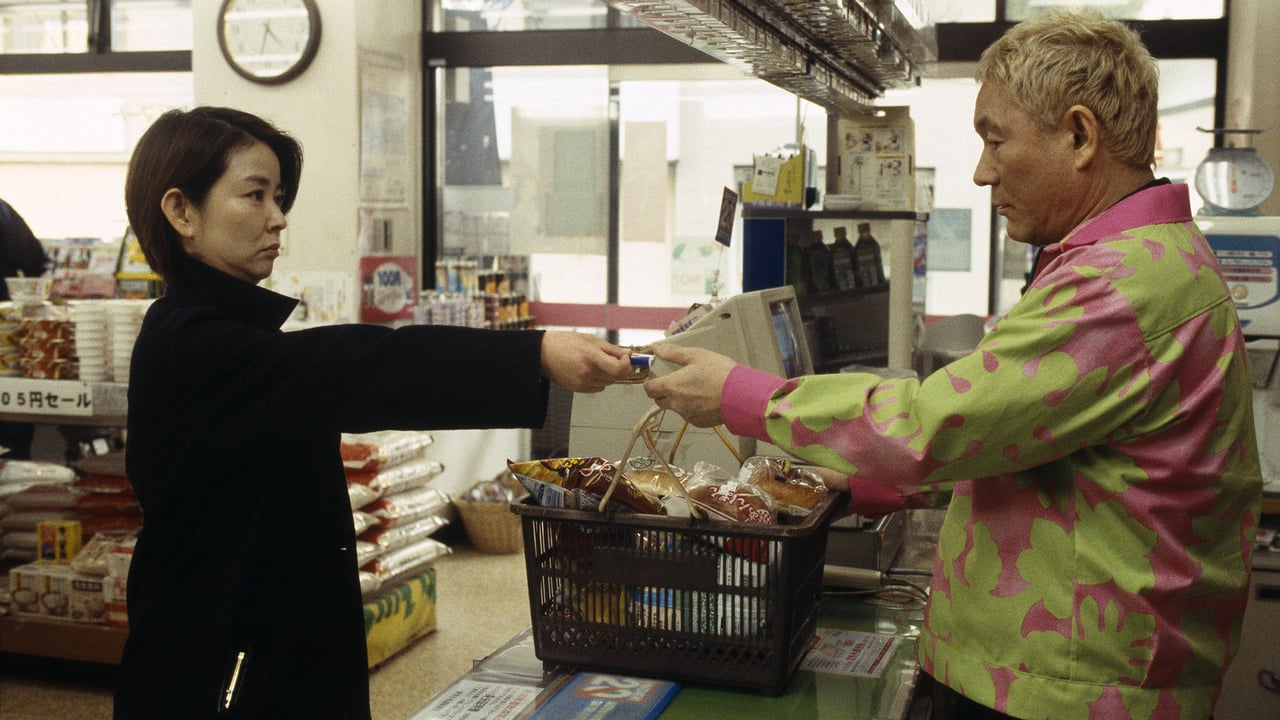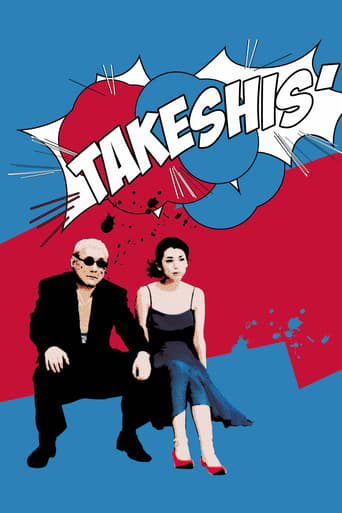

The greatest movie ever made..!
... View MoreIt isn't all that great, actually. Really cheesy and very predicable of how certain scenes are gonna turn play out. However, I guess that's the charm of it all, because I would consider this one of my guilty pleasures.
... View MoreIt's easily one of the freshest, sharpest and most enjoyable films of this year.
... View MoreAn old-fashioned movie made with new-fashioned finesse.
... View MoreA few words about Kitano San to begin with for the uninitiated. Many of you will remember that crazy old 80's TV show called Takeshi's Castle, where contestants participated in a myriad of next-to-impossible obstacle courses with predictably hilarious, injurious, I've-got-a-bad- feeling-about-this, results. Well this is that very same Takeshi. The very same Takeshi who then went on to make a name for himself in the 90's with hauntingly beautiful (and often very violent) Yakuza films, before finding relative international success in the 2000's with the fascinating Zatoichi, a movie about a blind samurai, a pair of revenge- seeking geishas, and tap-dancing. Obviously. And in between? Well, that very same Takeshi made a lot of weird ones too. And when I say weird, I mean crazy, messed up, only-in-Japan weird. If you haven't realised by now I'm a big fan of "Beat" Kitano, a nickname he often likes to call himself. I love his charisma, his takes-no-lip attitude. His facial twitches and odd mannerisms. His involvement in the incredibly psychotic cult classic Battle Royale. I even put up with a lot of the ridiculousness that happens in his films, acknowledging it instead as a unique artistic vision with the defiance of an over-fervent stalker fan. But this time, with Takeshis', you've gone too far, Takeshi. You have gone too far.Only someone like Takeshi Kitano can make this reviewer, in an attempt to explain the plot of this film with the utmost of his ability, sound like a complete and utter fool. Allow me to demonstrate: Takeshis' is a movie about the real life Takeshi, as a director, making a movie, and there are auditions for this movie. Fair enough, so far so good; if Kitano is making a mockumentary-type satire about himself, fine. I won't even mention how this movie (the movie being watched, not the movie within the movie being watched) actually started with a scene in a WWII setting. Not relevant, not one bit. But it sure doesn't help when one of the people auditioning for Takeshi's movie is also played by Takeshi, and that this Takeshi, a character working in a convenience store, is practicing for the role of, seemingly, the real Takeshi in the movie within the movie. Umm. And then it turns out that every new scene is totally unrelated from the last, but still contains the same imagery and characters we've seen moments earlier in a different context. And some of these scenes are dreams. And that this dreaming Takeshi is now an altogether separate character who drives a pink taxi around, and who is not auditioning for a part but still meeting all the same people these other two Takeshis have already met. And in the end, the convenience store Takeshi kills the real life director Takeshi. And that last bit really isn't a spoiler because (a) I have no idea as to what the significance of that scene even was, and (b) spoilers tend to ruin plot points and this movie, really, has no point. See what I mean? I was really trying there, too.Kitano has said that he wanted audiences to come out of this film not knowing what to say or what to think, so in that respect he has definitely succeeded, albeit in some deranged and sick Yoko Ono unit of measurement (Y/Onos per minute?). Takeshis' makes Being John Malkovich look like a predictable American sports film where the underdog team with the player who was always teased or came from a broken home scores the winning touchdown or basket or goal in the last second. Actually, I'd go as far as saying that Takeshis' makes even the most surrealist nonsense you could conjure up in your mind seem as certain as the knowledge that a hammer against a window equals smashed glass. And it is for this very fact; the fact that I understood precisely none of it and am certain that I will never see anything like it ever again in my lifetime, that I give it 4 stars out of 5. And as for you, Takeshi, I still reckon you're awesome, but I think it's also time we had a break as I go off to watch something I can comfortably understand. Predator it is, then.
... View MoreI don't think it's even possible to understand this movie if you aren't Japanese. And I'm not even sure most Japanese fans will really understand it. I can see elements of other Beat Takeshi films from Battle Royale to Zatoichi. And I'm sure that there are tons of references that I just don't recognize. But that's perfectly okay.If you think of this film as music for your eyes and don't worry about understanding it, it's very enjoyable. You could also say that it's meant to be looked at instead of 'watched', like a moving painting. It isn't necessary to understand every tiny piece to enjoy the whole. But don't let that scare you away. This isn't artsy fartsy crap. There are boobs and guns and yakuzas to keep it interesting.Of course I'm sure that many who consider themselves knowledgeable about Japanese cinema and Beat Takeshi in particular will think I'm talking out of my butt and will try to analyze and explain every little piece. And that's okay too, as long as they take time to actually enjoy the film.
... View MoreQuirky? yes. Disjointed? Yes. Hysterical? Absolutely. Having watched Kitano's interpretation of Zatoichi, Blood and Bones, Brother, Kikujiro and Battle Royal I and II, this movie is a complete spoof of his recent movie making career. How he managed to bring so many actors from all of these previous films onto one stage is quite something. In all honesty, viewers shouldn't try to read too much into Takeshis'. It's Kitano. It's Kitano showing us what he feels we know of him in his films. Explosive, comical, distant, a little off the hook. Takeshis' won't make much sense to someone who hasn't at least seen some of the aforementioned movies. Takeshis' is classic Kitano. You either like and understand this fellow, or you scratch your head in wonderment.
... View MoreMany will say this was a very strange film ; a film only for Kitano's fans. And yes, those who have an open mind and those who have seen and loved most of his previous films will love "Takeshis'". Enough said about them.Now, about all the rest, and its the majority of the audience, I think you cant use too many words to describe this film, and at the same time, there are so much one could say about the feedback he or she got from it.What everyone will accept though is that "Takeshis'" is a brilliant idea. But not only about the story itself. Its mostly how the director is using the story to comment the characters he has created as a writer/director over the years, that makes it brilliant.So newbies, go see this movie and if not anything else, you will laugh a little. But if you are lucky enough to sit back and enjoy it, you will possibly give yourself the opportunity to enter the beautiful world of Japan's greatest director today.
... View More